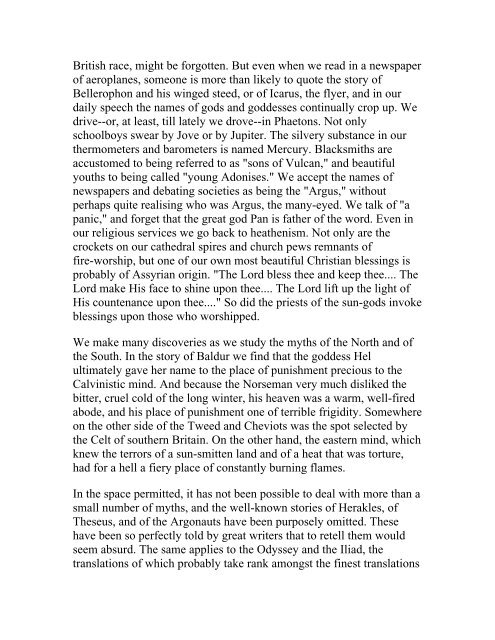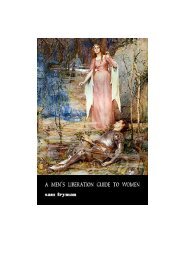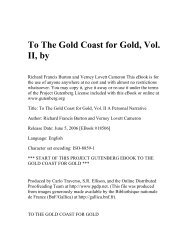- Page 1 and 2: A Book of Myths, by Jean Lang The P
- Page 3: and lost its beauty, there yet rema
- Page 7 and 8: PYGMALION 11 PHAETON 16 ENDYMION 26
- Page 9 and 10: Thus did Psyche lose her fear, and
- Page 11 and 12: that was to be his heritage. Promet
- Page 13 and 14: (Afterthought). For Epimethus it wa
- Page 15 and 16: endure the torment of having a foul
- Page 17 and 18: most perfect semblance of men and o
- Page 19 and 20: had made sacred to Galatea. On the
- Page 21 and 22: But at last she said to him, "Naugh
- Page 23 and 24: From the courtyard of the Palace th
- Page 25 and 26: wrought. That blazing chariot of th
- Page 27 and 28: suburban garden. That unlettered sp
- Page 29 and 30: [Illustration: SHE CHECKED HER HOUN
- Page 31 and 32: deep, hidden meaning in each part o
- Page 33 and 34: permission he sought, but solemnly
- Page 35 and 36: night, but as that of evening when
- Page 37 and 38: When the quest of the Argonauts was
- Page 39 and 40: But as the first fierce storm that
- Page 41 and 42: Once upon a time, so goes the tale,
- Page 43 and 44: which the fame of the fair Psyche h
- Page 45 and 46: arren rocks, the utter forsakenness
- Page 47 and 48: deny anything to Psyche, and on the
- Page 49 and 50: As a martyr walks to death, so did
- Page 51 and 52: sprang from the high cliff on which
- Page 53 and 54: And again the reeds murmured, "Bewa
- Page 55 and 56:
"Oh, foolish one," it said, "why do
- Page 57 and 58:
its ugly tomb in the dark soil, and
- Page 59 and 60:
and found, amazed, a fearless, whit
- Page 61 and 62:
"Aimed on the left side his well-ha
- Page 63 and 64:
ATALANTA Atalanta, daughter of the
- Page 65 and 66:
thou dost race with me, the goal is
- Page 67 and 68:
To Pallas Athené, goddess of craft
- Page 69 and 70:
them with pictures such as no skill
- Page 71 and 72:
shall fall--for oft by weathers tha
- Page 73 and 74:
dallying with Idas in the shadowy w
- Page 75 and 76:
of her dreams, his voice was as the
- Page 77 and 78:
were life to one whose beauty had w
- Page 79 and 80:
overshadowed by the past, and even
- Page 81 and 82:
"And now from their fountains In En
- Page 83 and 84:
daily had to face, sailed the seas
- Page 85 and 86:
came empty-handed, and as he stood
- Page 87 and 88:
But Athené said Nay, at his mother
- Page 89 and 90:
"but no mortal can obtain it, for o
- Page 91 and 92:
living as that of a flower in sprin
- Page 93 and 94:
wife. No marriage feast so splendid
- Page 95 and 96:
"Surely this stranger comes from Ol
- Page 97 and 98:
sons, and each son is more than the
- Page 99 and 100:
But the gods laughed. Like a harsh
- Page 101 and 102:
Zephyrus, god of the South Wind, ha
- Page 103 and 104:
This is the story of Midas, one of
- Page 105 and 106:
But when Midas, with the healthy ap
- Page 107 and 108:
First of all Pan took his fragile r
- Page 109 and 110:
hiding-place. The trees and shrubs
- Page 111 and 112:
For the air was full of the clamoro
- Page 113 and 114:
around the cave lurked the long dar
- Page 115 and 116:
like a ship driven on by the long o
- Page 117 and 118:
In the fragrance of the blossom of
- Page 119 and 120:
Wind and the North Wind wrestle tog
- Page 121 and 122:
For, from the carcase of one of the
- Page 123 and 124:
so fair. She had only tasted the jo
- Page 125 and 126:
she held most dear. "Give me back m
- Page 127 and 128:
LATONA AND THE RUSTICS Through the
- Page 129 and 130:
defiled." As she spoke, a change, s
- Page 131 and 132:
smiling at the remembrance of her m
- Page 133 and 134:
Grief had slain the body of Echo. O
- Page 135 and 136:
Fourteen years only have passed sin
- Page 137 and 138:
at length they looked like the pini
- Page 139 and 140:
higher, higher still, and when he s
- Page 141 and 142:
and give stare for stare to golden-
- Page 143 and 144:
voice sang snatches of song of his
- Page 145 and 146:
shall not hide him, nor shall his d
- Page 147 and 148:
whose white arms against the greenw
- Page 149 and 150:
fashioned for himself an instrument
- Page 151 and 152:
spear-wound through it. With terrib
- Page 153 and 154:
as she spoke, her tears and his blo
- Page 155 and 156:
the river), 'The only way, since go
- Page 157 and 158:
at length she stood on the edge of
- Page 159 and 160:
and so, by the hands of his river,
- Page 161 and 162:
Milton. Pan was dead, and the gods
- Page 163 and 164:
unutterable woe upon any of the son
- Page 165 and 166:
Near St. Goar, there rises out of t
- Page 167 and 168:
[7] Archilochus of Paros. [8] Fiona
- Page 169 and 170:
to come was possessed by Beowulf. I
- Page 171 and 172:
And Odin, seeing himself outwitted
- Page 173 and 174:
oath from anything in all nature, a
- Page 175 and 176:
Thus Loki, taking upon himself the
- Page 177 and 178:
Matthew Arnold. Gladly Hermoder mad
- Page 179 and 180:
were fit to receive him, and peace
- Page 181 and 182:
took place those things that are to
- Page 183 and 184:
lack marshes, unknowing that in the
- Page 185 and 186:
swiftly know whence ye have hither
- Page 187 and 188:
Grendel's scaly hide. Up and down t
- Page 189 and 190:
win, while he may, warlike fame in
- Page 191 and 192:
homeland and had told his kinsman t
- Page 193 and 194:
forth scorchingly, and its great mo
- Page 195 and 196:
FOOTNOTES: [9] Shakespeare (Julius
- Page 197 and 198:
would be allowed to retain his king
- Page 199 and 200:
"No one sent me," he said. "My moth
- Page 201 and 202:
"I had taken thee for another man,
- Page 203 and 204:
Leaving them behind with twenty tho
- Page 205 and 206:
comrades whose eyes never more woul
- Page 207 and 208:
humbly confessing his sins and begg
- Page 209 and 210:
King of Heaven! * * * * * May thy f
- Page 211 and 212:
Charlemagne then returned to Aix, a
- Page 213 and 214:
their love. To them in course of ti
- Page 215 and 216:
what her servants had scorned to do
- Page 217 and 218:
he stood, and greeted him in the gl
- Page 219 and 220:
the shattered victims of the destro
- Page 221 and 222:
Then said her brothers: "In Him we
- Page 223 and 224:
And Kemoc answered: "It is truth."
- Page 225 and 226:
In many ancient manuscripts we get
- Page 227 and 228:
"You will have a little grave apart
- Page 229 and 230:
questions about Naoise, she met a s
- Page 231 and 232:
delivered his message, and when he
- Page 233 and 234:
e alive. We will go with her to ano
- Page 235 and 236:
ut on Loch Awe and Loch Fyne, Loch
- Page 237 and 238:
But Deirdrê said, very quickly: "N
- Page 239 and 240:
the pure sand. O that I might not d
- Page 241 and 242:
heart of the king. For when Lavarca
- Page 243 and 244:
And Ainle also craved that death mi
- Page 245 and 246:
[18] Inistrynich. [19] Dun Sween. [
- Page 247 and 248:
133, 139, 140, 141, 142, 145, 164,
- Page 249 and 250:
Belvidere, Apollo, 11 Ben Cruachan,
- Page 251 and 252:
Cerberus, 34 Ceyx, 144, 145, 146, 1
- Page 253 and 254:
Dædalus, 181, 182, 183, 184, 185,
- Page 255 and 256:
Dun Sween, 324 Durendala, 276, 284,
- Page 257 and 258:
Fergus, 321, 322, 323, 325, 326, 32
- Page 259 and 260:
Greece, 26, 71, 72, 74, 154, 192, 1
- Page 261 and 262:
Ibycus, 192, 194, 195, 196 Icarus,
- Page 263 and 264:
Lebynthos, 186 Leinster, Book of, 3
- Page 265 and 266:
Meleager, 69, 70, 72, 74, 75, 76, 7
- Page 267 and 268:
North Cape, 260 North Sea, 244 Norw
- Page 269 and 270:
Persephone, 80, 161, 164, 165, 167
- Page 271 and 272:
280, 281, 282, 283, 284, 285, 286,
- Page 273 and 274:
Sleipnir, 236 Socrates, 153 Somnus,
- Page 275 and 276:
Tyrian, 86 Uffizi Palace, 124 Ulste
- Page 277 and 278:
The author also used alternative sp
- Page 279 and 280:
ANYTHING with public domain eBooks.
- Page 281 and 282:
This eBook is for the use of anyone
- Page 283 and 284:
eceipt of the work. - You comply wi
- Page 285 and 286:
harmless from all liability, costs
- Page 287:
Please check the Project Gutenberg
















